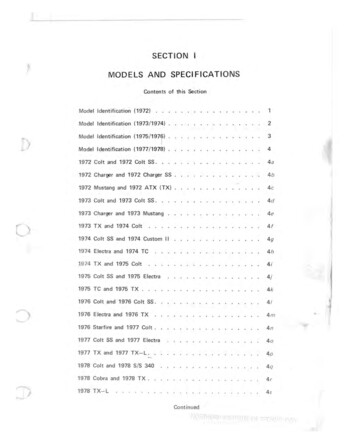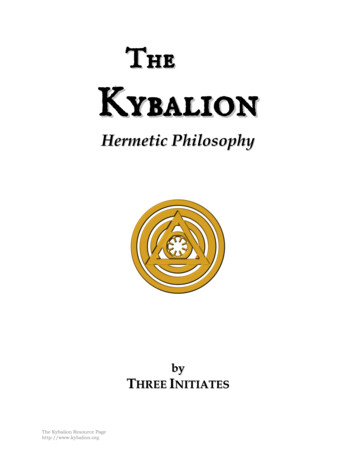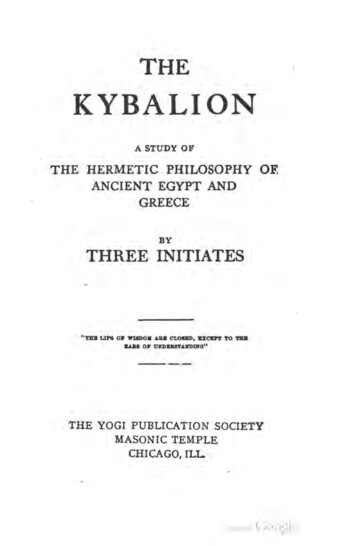
Transcription
".EURIPIDESMEDEAAND OTHERPLAYSMEDEA· HECABE ELECTRA· HERACLESTranslated with an Introductlon byPHILIP VBLLACOTTPENGUIN BOOKS
NTRODUCTION*f':7sMEDEA (431 B.C.)OF the four plays in this volume, three have in common a point ofspecial interest for their first audience. Medea, Electra, and Herac1es areset respectively in Corinth, Argos, and Thebes j but for the'solution oftheir dilemmas, the cleansing of their guilt, they all look to Athens.This observation perhaps illumines one aspect of the unique greatnessof Athens. The hypOCriSY ofneglected ideals has often been condemnedas a major sin; but in the moral world as in the romantic, it is better tohave loved and lost than never to have loved. The Athenians in theiractions were certainly as cruel, as dishonest, as greedy, as revengeful.as irreligious, as other Greeks; but in their thoughts and aspirationsmany of them loved and honouredjustice, integrity, and generosity, andloved their city as the shining embodiment of those virtues - which itwas not. Faith without works, may be dead - but faith is seldolD en tirely without works; and the works ofthe tragedians kept alive the faithof Athenians in the beauty of goodness, and in what their city had some times tried to be, even ifsuccess had been rare: the sanctuary of HelIas.In Electra, Orestes' guilt was incurred wittingly - but at the com mand of a god; in Herac1es, the crime was committed in pure innocence.By contrast, Medea's only excuse was her natural passion for revenge;yet she, no less than the others, could rely on sanctuary in Athens.The Chorus of Corinthian women follow their celebrated h. ofpraise for Athens with questions voicing the instinctive protest thatthere are degrees of wickedness which pollute sanctuary - but thatcannot change the story. That this principle of the open gate still hadsignificance in historical times is shown byThucydides' insistence on itin Pericles' Funeral Speech (in Book ii), where it is stated with pridethat Athens allowed free coming and going through her city gates. InMedea Euripi des' compliment to his city in this hymn of praise appearsin, some measure to compensate for the effect of the preceding scene A general Introduction to the life and work of Euripides Is given IDAlcertls aud 0t1w PIty's (Penguin Classics).'1
INTRODUCTIONINTRODUCTIONThe king of Athens and his &iendly offer to Medea were part of theunalterable legend, and would be accepted as such by the Athenianaudience; but the treatment of the episode in this play is not onlycuriously arbitrary and unrelated to the rest of the action, but morethan a little satirical; and the figure of Aegeus provides the one Bickerof relief in the otherwise uniform sombreness of the drama.This, the earliest extant tragedy of Euripides (it is preceded only byAIcutls), shows a moral pattern similar to that of his last work,71HBacchae. It opens with an oppressed victim claiming the sp:npathy ofChorus and audience. As the action develops inevitably, and thepunishment shows itself twice as wicked as the crime, sympathychanges sides; and we are left with only one comfort, that since theworst has been reached, there can be no worse thing to follow.To appreciate the balance of this play, we must take care not to pre. judge Jason. He was a man of entirdy respectable ambitions; and tothese ambitions Medea presented two fatal obstacles: she had involvedhim in murder before ever he came to Corinth; and as a non-Greekshe could never be recognized by Greeks as his wife. And the first ofthese obstacles is of course part of the reason for the second. Marathonand Salamis had made the Athenians vividly conscious that theestablishment and growth of civilized values in a barbarous world laywith them alone as the leaders of Hellenic culture. For Greeks,'civilized' life meant controlled, orderly, proportionate life, lIo7jan!yae1l, 'No excess·.M a principle this applied equally to e politics, social habits, art. To them it was the only life, and the want ofIt a living death. Those who had died for it in the great battles or inresistance to tyrarmy were their most honoured heroes. This is theprinciple for which Jason stands. If his behaviour strikes us as repellent,that is how the behaviour of Athenians struck many Greeks of otherStates in the days when Athens claimed to be the champion of theGreek way of life, and the firm opponent of barbarism and all itaways.In the great world the forces of civilization are a heroic minority,and their course is simple enough: to win or die. In a Greek city, suchas the Corinth of this play, the forces of civilization rule, and bar barism appears - here in the person of Medea - as the heroic minori ty. The play shows a truth which many Greeks must have recognized.though it was seldom acknowledged in so many words: that when a8.collllIlunity or a nation has adopted, in its political and social institu tions, the quality of self-control, sophlo ne, It soon learns that thisquality belongs only in limited measure to its citiz -; that the prin ciple of barbarous excess is predominant in most individuals, so thatthe constant concern of government is to deal with barbarism insidethe walls and in the council-chamber, as well as in foreign lands. Justas in the modem world democracy, desperate to resist totalitarianism,resorts to totalitarian methods. weakening its own life in the process,so the fiery Greek temperament made the menace of barbarism theexcuse for its own excesses.In the character of Jason a concern for civilized values is joined witha calculating coldness and an unscrupulous want of feeling. In that ofMedea warmth of feeling grows on the same stem as emotional excessand the propensity to violence. Here we see an issue which again issimilar to that found in The Bacchae. The lesson of both plays is thatcivilized men ignore at their peril the world of instinct, emotion, andIrrational experience; that carefully worked-out notions of right andwrong are dangerous unless they are flexible and allow for constantadjustment. And the ending of Medea, with the Sun himself, the sourceof all life and warmth, vindicating the cause of passion, disorder,violent cruelty, against the cold, orderly, self-protective processes ofcivilized man, is a reminder that the universe is not on the side ofcivilization; and that a life combining order with happiness is some thing men must win for themselves in continual struggle with anunsympathetic environment.HECABE (.PS B.C.)This play combines two themes, both of which Euripides treated alsoin other plays. First, the complacent hypocriSY with which menjustify cruelty in the name of military or political necessity; second,the tendency of revenge to be more wicked than the crime whichprovoked it, and thus to forfeit sympathy and the claim of justice.Besides these two themes we have, in the first part. the heroic figureofPolyxena - enough in itself to make the play memorable; and inthe se,cond half the vivid interplay of character between Agamemnonand Hecabe. It is a straightforward play for fine actors, offering Simpleemotion rather than question or conflict.'It has been strongly criticized on the ground that it falls apart into9
INTRODUCTIONINTRODUCTIONtwo scarcely Connected episodes, concenled respectively withPolyxena and with Polydorus and Polyrnestor. The same criticism isoften levelled at other plays such as Hippo/ytus and Andromache, and insome cases reflects a feature of Greek plays which arose inevitably fromthe restriction of the number of actors to three. In this play, however, .that excuse is hardly needed. The play Is about ruthless cruelty, andthe different results it may produce for both sufferer and spectator.The cruelty of the sentence on Polyxena is transmuted by the heroism .of Polyxena herself to an episode of awe-inspiring beauty. Thecruelty of Polyrnestor to Hecabe's son is matured by the reaction ofrevenge into something prQlit;less and repellent. Not even Agamem non's verdict can justify Hecabe; for It is so evidently the result of abad conscience over Polyxena. The whole point of the play lies in thecontrast between its two halves; so that to criticize this division islargely irrelevant.Throughout the action Hecabe is the central figure. The legend saidthat the accumulation ofher sufferings drove her mad, and that she wastransformed Into a dog. The promontory called Cynossema, the Dog'sTomb, on the coast of the Thracian Chersonese (Gallipoli) wufamiliar to Greek sailors as the traditional site of Hecabe's burial. Thelegend itself is a comment on the effect of prolonged anguish on the .mind; and this was a subject which greatly occupied Euripides. Inthis play Hecabe's depth of grief has almost reached the limit of en durance when the action begins. Polyxena's death is made endurableby Polyxena's own nobility; but a further blow is fatal, and Hecabe istransformed into a raving savage.It has to be remembered that the annihUation of a city was an actwhich Athens, like other military powers, was capable of deciding onand carrying out. It had been decided on (and revoked at the very lastJIloment) in the case ofMytilene in .p 1 B. C ., two years before the pro duction of this play; it was carried out in the case ofMelos in.p 6 B. c.,a year before the production of The Women of Troy The Greeks werea cruel race, and at the same time an emotional race capable of deepfeeling. How much real influence a dramatic poet might exert (neces earlly after the event) on the public actions of his City is impoSSible toestimate; but two pieces of evidence come to mind. One is the sceneIn the second half of Aristophanes' The Froa', where Aeschylus and Included in The &a:b and 0iJ.u PltgJ (penguin ClassiCII).Euripides are matched against each other for their value to the citizensof Athens. The other Is the story of the heavy fine inflicted on Phry nichus (an older contemporary of Aeschylus) for moving his audienceto tears with his play about the capture of Miletus. However that maybe, the chief interest of this play for modern readers is probably fbieloquence and pathos.10ELECTRA ( 1 B.C.)Electra has often been a puzzling play for modern readers. This has notprevented if from becoming also one of the most popular in transla tion, probably because of the Striking realism which Euripides hereemploys both in dialogue and in situation. Many performances, how ever, must have left English audiences largely in the dark on twopoints at least: the intended characters of Electra and Orestes, andthe Significance of the curious recognition-scene. Before examiningthese in detail we should take a general look at Euripides' treatmentof one of the best-known stories in the Troy cycle.The framework of the story, used also by both Aeschylus andSophocles, was as follows: before Agamemnon returne l from Troy,Electra, fearing that Aegisthus would murder Orestes, bad sent himaway from Argos to be brought up by Strophius, king of Phocis.Orestes at the time of Agamemnon's murder was about eleven years ofage. As soon as he reached manhood he was commanded by theDelphic oracle to go to Argos and avenge his father by ldlling Clytem nestra and Aegisthus. He reached Argos in disguise. revealed himselfto his sister, and with her help accomplished his mission. As a shed der of kindred blood he was then pursued and tormented by theFuries.Using this material Aeschylus wrote a drama in which the conflictbetween divine command and moral instinct is fought out In the personof Orestes. Sophocles wrote a dramatic study of Electra as the daughterwho turned against her mother that obsession with revenge which shehad inherited from her. In these plays the ligures of the protagonistsare presented on a heroic scale. Though the horror of matricide isrecognized, it is not doubted that such acommand might have divinesanction. In Euripides' play both Orestes and Electra are far fromheroic; the murder of Aegisthus is shown as, at the best, inglorious;that of Clytemnestra as revolting. Yet then, and only then, whenII
INTR.ODUCTIONINTR.ODUCTIONbrother and sister, having achieved their purpose, stand as the trem bling victims of a profitless, relentless, and false tradition of gloriousrevenge, do we, the audience, feel pity for them.The obligation and indulgence of revenge played a constant anddisastrous part in Greek history, and often gave an unpleasant colourto otherwise attractive characters. This feature of Greek life Euri pides sometimes (like Aeschylus) regards as an aspect of the search forideal justice; more often he presents it as sheer folly, as the principlewhich perpetuates and aggravates evil and produces no good whatever.In this play he was dealing with a revenge-saga in which long andfamiliar tradition had upheld the principle in spite of every circum stance of horror. Aeschylus had justified and purified Orestes in theend; Sophocles had never questioned the nobility and justice ofhis act.Euripides here shows the revenge as conceived and executed in fearand weakness. Orestes, faced with his dilemma, trusts the oraclebecause he has not the strength to trust his own moral instinct; butneither has he the strength to trust in the rightness ofwhat he has doneat Apollo's con:uitand. For Euripides, the brutality ofthis command wasa challenge to Orestes, just as the colDDllind to sacrifice Iphigenia hadbeen a challenge to his·father. Both, being weak, preferred sin underauthority to the risks of moral independence.A crucial point in the interpretation of the whole play is the re cognition scene (lines 487-S81).* Dispute has often turned on thequestion why Euripides in this scene should malee, as it appears, adetailed criticism of Aeschylus' treatment of the recognition in Th,Cboephod, and ridicule the use there made of 'signs' such as the lockof hair and the footprints. This question will be considered presently;but it is a secondary one. The prime question is, Why is the recog nition so long delayed and so reluctant? To answer this we must lookat clues already given in the early scenes to the characters of Electraand Orestes.Electra in her opening conversation with the Peasant uses severalphrases which suggest that her degradation and grief have led toexaggerated self-pity; and that this indulgence is her one luxury in life.The next scene, Electra's conversation with the Chorus, shows clearlyarticle, 'The Anagnorisis In the Electra of Euripides' by David Raeburn (notyet published).that there is no substance in her complaints that she is without friendsand cut off from social life; and that the squalor of her personalappearance is a neurotic affectation. Various lines in subsequent scenessuggest further that she exaggerates the dishonour shown to Agamem non's body; and that Orestes' slowness in appearing to rescue her isone of her favourite grievances.Next let us turn to Orestes. In Electra's imagination her absentbrother is a romantic hero. The suggestion that he might come toArgos secretly makes her indignant. When Orestes himself enters, hesoon shows that the notion of matricide is a thing he can hardly bearto put into words. He has not dared to enter the walls of Argos; he iskeeping near the frontier, partly to escape quickly ifrecognized, partlyto find his sister and consult with her.Presently their conversation reaches the point where Orestes asks,'How would Orestes, if he came, react to your situation?' Electra'sanswer makes it clear that she expects him to carry out full revenge atonce, and that she.herselfwill go to any length in helping him, evento the point of killing Clytemnestra with her own hands. Clearly thisis the point where Orestes should reveal himself, so that a plan can beconcerted. He does not reveal himself. Why? It can only be because heknows that, once Electra recognizes him, he is irrevocably committedto murdering his mother. Electra will never let him off.When eventually the Old Man insists on identifying Orestes,Euripides presents us with a scene in which the chief emotion isembarrassment. Orestes is consciously reluctant to be recognizedbecause he sees all too clearly the inevitable consequence; and Electrais unconsciously reluctant to recognize him because, having for so longnursed the grievance of his failure to appear, she cannot bear to seethat grievance removed. This tragi-comic situation explains the slow ness of the recognition, the nervously foolish remarks of both brotherand sister, and the perfunctory exchange of endearments whichfollows.A further mystery is solved by this interpretation of Euripides' pur pose. The traditional features of this story included not only theRecognition but the 'signs' by which it was effected: the lock of hair,the footprints, and the piece of cloth, woven by Electra, whichOrestes wore. These signs might or might not be convincing in them selves: they belonged to an early and unsophisticated period, and wereJ213* For ideas contained In this section [ am largely Indebted to an llluminatUlg
INTRODUCTIONpart of the story. To include them as the means oj r«ognftJ.oD would beincongruous with that realistic treatment of the main characters andsituation which was to provide the special interest of the play. WhatEuripides did, therefore, was to make these signs, not the means ofrecognition, but an ingenious excuse for that delay of recognitionwhich Electra and Orestes, as he conceived them, desired for theirown different reasons. And when Electra has rejected all three intheory, she underlines the ambiguity of her attitude by finally accept ing a fourth sign - the scar - which has been plainly visible to her forthe last half-hour.The rest of the play needs little comment. In the account of thekilling of Aegisthus no detail is spared which could emphasize thatOrestes' exploit is not only unheroic but sacrilegious; and Electra'sexalted praises, showing that her mental image of her brother isimpervious to sordid fact, add an acutely satirical note. After theMessenger's deSCription of the hearty and hospitable' Aegisthus, we areintroduced to the quiet, chastened, conciliatory figure of Clytemnes tra. Electra is unmoved; she will force Orestes to carry out his under taking to the end, even in face of this defencelessness. Then, as welearn afterwards, at the crucial moment her nerve fails, and she leavesOrestes to do the actual killing. When the deed has been done,brother and sister, who. a little while earlier were trying not to knoweach other, find themselves alone together in a condemning world;and having discovered that each is the other's only friend, they areforced to part.HERACLES,,:(420 B.C, 1)The structure of this play is very simple. Neither thecow-se of eventsnor the interplay of characters provides anything dramatically notable,except for the appearance of immortals in the 'middle of the play,which will be referred to presendy. The story is the vehicle for thatstraightforward eloquence on the theme of human suffering, of whichEuripides was a master. The world presented, here is the familiarworld where neither birth nor wealth, piety nor courage nor inno cence, gives any guarantee against the power of wickedness or themalevolence of chance. What .the spirit of man can aim at achieving isa dignity which remains when the gods have, withdrawn or joined thelide of evil, a serene despair which knowathat the world contains no INTRODUCTIONhigher hope than the human spirit can find within itself. And InHeraclu a further encouragement is given: the firmness of humanfriendship as the one resource availabl in the depth of suffering.These simple truths are stated with a spacious and satisfying poeticpower; and that is the chief interest of the play.One unusual feature is worth special notice: the sudden and un expected appearance, half-way through the play, of Iris and Madness.In Euripides supernatural beings, if they appear at all, generally do soat the beginning of a play to explain a situation, or at the end toprovide - or offer - a solution. Critics have sometimes censuredthis appearance in Heraclu as arbitrary and unmotivated; for Irissimply announces herseIi a:. the' agent of Hera's jealousy towardsHeracles. But the absence of rational motive is surely the dramatist'spoint. By this visitation he is describing the character, not of any godor human being, but of events themselves, as he observes them'occurring in a world which he regards as ruled by Chance - adiVinity not only blind but probably malevolent. His description of theworld conveys a message entirely different from that of Sophocles. Tothe questions of a sufferer Sophocles offers one answer: reverence forthe' unfathomable wisdom and power of Zeus. Euripides wrote for menwho had lost that faith, and exhoned them to rely on themselves, and,if they were fonunate, on the loyalty of friends. In this play Amphi tryon in particular illustrates what must have been the progress ofmany religiously-minded Athenians, from belief in divine goodness anda rather smug confidence in divine favour, to a conviction that thewhole concept of moral goodness begins, operates, and ends In manalone.This theme is given an unusualldnd of confirmation by a passage inthe last scene. Theseus, trying to dissuade Heracles from suicide,drags in the somewhat irrelevant argument that gods have often been .guilty of unchastity and yet continue to live in Olympus and are notheyond consolation. Heracles replies that he has never believed suchstories. These words of Theseus are a curious echo from the Nurse'sspeech to Phaedra in HippoJyws: 'Yet they live in heaven, and show nohaste to quit the company of gods. Events have proved too strong forthem; and they, believe me, are content In Hlppo!yws this argumentIs uSed by the Nurse, whose moral attitude is more than dubious,while here it is Theseus who speaks, the godlike hero. In both plapIS
.I11jilIIJINTRODUCTIONthe audience is invited to disbelieve these tales; in Hippo!ftus by thecharacter of the Nurse, here by Heracles' reply. In both cases theimplied lesson is that an intelligent man should not rely on the godsfor an acceptable standard of moral b viour, any more than for pro tection in danger. Man must be his own god, and stand or fall by hisown decisions.Yet another aspect of this kind of 'humanism' is suggested in thesame SCene. Guilt, and the various ways of dealing with it, are 1constant theme of tragedy. Guilt may be punished with death, as inthe case of Clytemnestra;' or expiated by suffering, as in the case ofOrestes; or forgiven by a victim,as in the case of Theseus in Hippo!! tus. What of Heracles' guilt? The modem reader will feel that, sincethe play clearly shoWll his madness as sent upon him by divine agency,Heracles is not m.oralIy guilty. He himself, however, does not takethis view; he knows t he is guilty. But his guilt is not somethinghe can disown; it is a part of his life, which from beginning to end hasbeen a life of violence. Heracles looks at the famous bow which hasbrought him victory in so many struggles, and has now killed his wifeand children. Is he to take it with him to Athens? Or must he abandonIt? 'Never! This bow is anguish to me, yet I cannot part with it.'He is HeracIes, and can never be any other man; even the madnesswhich came on him is a part of his nature which he must recognizeand learn to live with: He is himself the only person who has the rightto forgive what he has done. He knows himself; he will keep his bow.The tide ofthis play is given in some MSS. as 'Heracles Mainomenos','The Madness of HeracIes'. The addition may have been made todistinguish it in reference from 'The Heracleidae', 'The Children ofHeracles'. Most modem editors call it 'Hercules Furens' , which!s lUlunnecessary Latinism. Latinism in Hellene affairs is almost always to bedeplored.MEDEA*Characters :NURSETUTOR toMedea's SODSMEDEAC H 0 R U S if Corinthian womenC REO N, kino if CorinthJASONAEGEUS,ldnoif AthensMESSENGERMEDEA'STwoCHILDREN*Scene: BeforeJason's bouse in CorinthN U RS E: If only they had never gone I If the Argo's hullNever had winged out through the grey-blue jaws of rockAnd on towards Colchis I If that pine on Pelion's slopesHad never felt the axe, and fallen, to put oarsInto those heroes' hands, who went at Pelias' biddingTo fetch the golden fleece I Then neither would Medea.My mistress, ever have set sail for the walled townOf lolcus, mad with love for Jason; nor would she,When Pelias' daughters, at her instance, killed their father,Have come with Jason and her children to live hereIn Corinth; where, coming as an exile, she has earnedThe citizens' welcome; while to Jason she is allObedience - and in marriage that's the saving thing,When a wife obediently accepts her husband's will.But now her world has turned to enmity, and wounds herWhere her affection's deepest. Jason has betrayed17
IIII':,:;I'1;:1;EURIPIDES[17-n)[H-8.dMEDEAHere come the boys, back from their running. They've nothoughtOf this cruel blow that's fallen on their mother. Well,They're young; young heads and painful thoughts don't gotogether.Enter the"TuTOR with MEDEA'S Two SONS.TUTOR: Old nurse and servant of my mistress's house, tell me,What are you dOing, standing out here by the door,All alone, talking to yourself, harping on trouble?Eh? What does Medea say to being left alone?NURSE: Old friend, tutor of Jason's sons, an honest slaveSuffers in her own heart the blow that strikes her mistress.It was too much, I couldn't bear it; I had to comeOut here and tell my mistress's wrongs to earth and heaven.TUTOR: Poor woman I Has she not stopped crying yet?NURSE:Stopped crying?I envy you. Her grief's just born - not yet half-grown.TUTOR: Poor fool- though she's my mistress and I shouldn'tsay itShe had better save her tears. She has not heard the worst.NURSE: The worst? What now? Don't keep it from me. Whathas happened?TUTOR: Why, nothing's happened. I'm sorry I said anything.NURSE: Look - we're both slaves together: don't keep me inthe dark.Is it so great a secret? I can hold my tongue.TUT 0 R: I'd gone along to the benches where the old men playAt dice, next to the holy fountain of Peirene;They thought I was not listening; and I heard one sayThat Creon king of Corinth means to send these boysAway from here - to banish them, and their mother too.Whether the story's true I don't know. I hope not.NURSE: But surely Jason won't stand by and llee his sonsBanished, even if he has a quarrel with their mother?TUTOR: Old love is ousted by new love. Jason's no friendTo this house.NURSE:Then we're lost, if we must add new troubleTo old, before we're rid of what we had already.TUTOR: But listen: it's no time to tell Medea this.Keep quiet, say nothing about it.NURSE:Children, do you hearWhat sort of father Jason is to you? My cuneOn - Nol No cune; he is my master. All the same,He is guilty: he has betrayed those near and dear to him.TUTOR: What man's not guilty? It's taken you a long time tolearn1819His own sons, and my mistress, for a royal bed,For alliance with the king of Corinth. He has marriedGlauce, Creon's daughter. Poor Medea I Scorned and shamed,She raves, invoking every vow and solemn pledgeThat Jason made her, and calls the gods as witnessesWhat thanks she has received for her fidelity.She will not eat; she lies collapsed in agony,Dissolving the long hours in tears. Since first she heardOf Jason's wickedness, she has not raised her eyes,Or moved her cheek from the hard ground; and when herfriendsReason with her, she might be a rock or wave of the sea,For all she hears - unless, maybe, she turns awayHer lovely head, speaks to herself alone, and wailsAloud for her dear father, her own land and home,Which she betrayed and left, to come here with this manWho now spurns and insults her. Poor Medea! NowShe learns through pain what blessings they enjoy who are notUprooted from their native land. She hates her sons:To see them is no pleasure to her. I am afraidSome dreadful purpose is forming in her mind. She isA frightening woman; no one who makes an enemyOf her will carry off an easy victory.
EURIPIDES(86-116]That everybody loves himself more than his neighbour.These boys are nothing to their father: he's in love.NURSE: Run into the house, boys. Everything will be allright.[The children move away a little.]You do your best to keep them by themselves, as longAs she's in this dark mood; don't let them go to her.I've watched her watching them, her eye like a wild bull's.There's something that she means to do; and I know this:She'll not relax her rage till it has found its victim.God grant she strike her enemies and not her friendslME DEA'S voice is heardfrom inside the house.MEDEA: Oh, ohl What misery, what wretchedness IWhat shall I do? If only I were dead INURSE: Therel You can hear; it is your motherRacking her heart, racking her anger.Quick, now, children, hurry indoors;And don't go within sight of her,Or anywhere near her; keep a safe distance.Her mood is cruel, her nature dangerous,Her will fierce and intractable.Come on, now, in with you both at once.[The CHILDREN 80 in, and the TUTORjOllows.]The dark cloud of her lamentationsIs just beginning. Soon, I know,It will burst aflame as her anger rises.Deep in passion and unrelenting,What will she do now, stung with insult?MEDEA [indoors]: Do I not suffer? Am I not wronged? ShouldI not weep?Children, your mother is hated, and you are cursed:Death take you, with your father, and perish his wholehouse INURSE: Oh, the pity ofitl Poor Medea IYour children - why, what have tht;Y to do20(1I6-IHlMEDEAWith their father's wickedness? Why hate them?I am sick with fear for you, children, terrorOf what may happen. The mind of a queenIs a thing to fear. A queen is usedTo giving commands, not obeying them;And her rage once roused is hard to appease.To have learnt to live on the common levelIs better. No grand life for me,Just pea :e and quiet as I grow old.The middle way, neither great nor mean.Is best by fal, in name and practice.To be rich and pow
INTRODUCTION . The . king . of Athens and his &iendly offer . to . Medea were . part . of the . unalterable legend, and would be accepted as such by the Athenian








